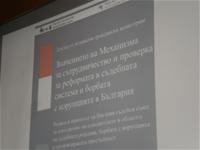Bulgaria: SJC vs. CVM
Ralitsa Kovacheva, February 7, 2011
 European Commission spokesman Mark Gray likes to joke with Bulgarian journalists that whenever a CVM report of the Commission is coming, “Bulgarian media are just obsessed by two questions - when the report will be published and whether it is good or bad (and are we better than Romania)”. In fact neither the exact date is so important, nor can a formal estimation can be put on a report. What is really important is the content and, of course, how it will be read.
European Commission spokesman Mark Gray likes to joke with Bulgarian journalists that whenever a CVM report of the Commission is coming, “Bulgarian media are just obsessed by two questions - when the report will be published and whether it is good or bad (and are we better than Romania)”. In fact neither the exact date is so important, nor can a formal estimation can be put on a report. What is really important is the content and, of course, how it will be read.
Brussels's reports are no longer expected with a thrill, and their coverage in the public domain is reduced to government reactions - before they were purely protocol ones, and now – obtrusively thankful. Indeed, the right question about the report, if it has to be only one at all, is never asked - what's new this time. Because, while repeating the same observations, apparently to show that the problems are not solved, the Commission always adds new elements (for example, in the report of July 2010 there was a major focus on public procurement). Exactly by tracking these new topics we can see how the observed events have developed - in the field of judicial reform and fighting corruption and organised crime.
What can we expect from the February interim report? With this question in my mind I  went to the discussion on the Cooperation and Verification Mechanism (CVM), organised by the Institute for Public Environment Development. The occasion was the NGO's report analysing the implementation of the measures under the recommendations of the Commission, for which the Supreme Judicial Council (SJC) was responsible. The main conclusions of the bulky study are alarming given that this is the fifth year of the Mechanism. And yet:
went to the discussion on the Cooperation and Verification Mechanism (CVM), organised by the Institute for Public Environment Development. The occasion was the NGO's report analysing the implementation of the measures under the recommendations of the Commission, for which the Supreme Judicial Council (SJC) was responsible. The main conclusions of the bulky study are alarming given that this is the fifth year of the Mechanism. And yet:
There are no indicators to evaluate and analyse the implementation of the measures - quantitative and qualitative.
There is a purely formal implementation of the measures, but we cannot say if it has led to effective improvements in the judiciary. Judging by the latest report from July 2010, these are symbolic.
There is no Bulgarian evaluation of the implementation of the measures, which make us only spectators, expecting from Brussels to announce the results, although the work is being done entirely at local level.
There is another finding, which I didn’t expect but it emerged during the discussion. The so called “government of the judiciary” - the Supreme Judicial Council – is treating the CVM with distrust and is taking it as an insult. The statements of the SJC members, who participated in the discussion, and the reactions of those who remained silent, clearly showed that the Mechanism was unnecessary and that it was a matter almost of national pride the CVM to be removed. One of the reasons for this attitude, as some of the senior magistrates explained, was that they were feeling isolated from the process of gathering information, submitted by Bulgaria to the Commission, while the report was being prepared.
 Moreover, according to Georgi Shopov, Chairman of the Committee on the Proposals and Appraisal of Judges, Prosecutors and Investigators with the SJC, many things, which had been done by the SJC were missing from the Commission's reports. On euinside's question why was this happening, members of the SJC responded in chorus: “Well, ask the Ministry of Justice!”
Moreover, according to Georgi Shopov, Chairman of the Committee on the Proposals and Appraisal of Judges, Prosecutors and Investigators with the SJC, many things, which had been done by the SJC were missing from the Commission's reports. On euinside's question why was this happening, members of the SJC responded in chorus: “Well, ask the Ministry of Justice!”
According to Stefan Petrov, Chairman of the Committee on Conflict of Interest with the SJC, the Council is not interacting with the Commission, only the Ministry of Justice. “Before the experts [of the EC] come, we are being told that they would meet with certain people and they were interested in specific issues and cases. They just don’t care about the issues that we want to put on the table”.
To clarify whether it is possible the SJC to be under-evaluated in the CVM reports due to information gaps, euinside asked the Ministry of Justice (MJ) about the process of collecting data submitted by Bulgaria to the Commission and how the SJC was involved. We received extensive answers to our questions even within the working day from the new Cooperation and Verification Mechanism Directorate. They reveal that, according to the Ministry of Justice there is a good dialogue between the institutions in which the SJC is participating every day and it cannot be argued that the SJC does not fully communicate with the European Commission.
On a monthly basis, the SJC and the Inspectorate with the SJC submit information on the implementation of the envisaged measures, which is being sent to the EC. “All the information about the SJC's work is being prepared by the SJC.” Prior to its yearly mission, the EC sends a specific questionnaire on topics of interest to the Commission which will be discussed during the mission. The questions are being distributed by topics by the Intra-Agency Coordination Team, which involves a Representative of the SJC, the Chief Prosecutor and the Chief Inspector. “Every question is being analysed and directed to a person who is competent to answer. By what mechanisms the answers are being prepared within the SJC, the most accurate information can be provided by its members.” During the discussion, however, Mr Georgi Shopov asked if anyone found such a questionnaire to show it to him, because, he said, the SJC had never seen it.
After completing the questionnaires, the information is being summarised by the Ministry of Justice. At that stage, however, it is also difficult to assume gaps or discrepancies can happen because, before being sent to the Commission, the information is being subjected to re-coordination, i.e. the SJC should have an idea what exactly is being reported to Brussels.
As to the meetings with the Commission’s experts during their missions in Sofia, the MJ argued that “since the creation of the CVM until now there has been no expert mission of the EC, which has not met with SJC”. Contrary to what Mr Petrov with the SJC stated, the Ministry described the meetings as follows: “At these meetings, except from presenting their work, Bulgarian institutions have the opportunity to answer all the experts' questions and also to ask their own questions regarding the Commission's views and recommendations.” The Commission itself determines the topics for discussions and the representatives of the SJC, who will be met - the chairmen of the committees responsible for the discussed topics (usually 5-6 members of the SJC). The meetings last about 4-5 hours and there are no obstacles in the communication between the SJC and the EC experts, the MJ states. "There is no case so far in which the EC has refused to discuss a topic, or to hear a member of the SJC.”
Furthermore, the Special Representative of the European Commission in Sofia, who is responsible for the CVM “holds regular meetings, attends the SJC meetings, the Parliament sessions, court hearings etc.”, MJ notes.
The SJC participates in discussions on the draft report too, which, before being formally published by the European Commission, is being sent to Bulgaria for last comments and corrections of inaccuracies. The reaction time is usually just one day, therefore the Intra-Agency Coordination Council is being convened to get acquainted with the project and to prepare the Bulgarian response. So “all representatives of the judicial authorities (including SJC) not just get acquainted and are being asked, but practically they prepare the answer.”
According to the Ministry of Justice, "the Mechanism is not designed to evaluate one or another institution or body. EC does not look at any Bulgarian authority as a subject of “evaluation“. Namely this position, however, apparently is not shared by the SJC, or at least by some of its members. “We behave before the EC like students to a teacher, regardless of how prepared we are. It is high time Bulgaria to take a position on this issue”, Stefan Petrov called emotionally. He added that it appeared that “whatever we do, the CVM will continue to exist.”
I am far from thinking that the words of certain members of the SJC can be considered as an official position of the Council, but the reaction of its members, attending at the discussion, eloquently showed that this view was broadly shared. I was left with the impression that the SJC hadn’t enjoyed this "unhealthy" interest by both the Commission and the society. The only words which sounded more self-critically were those of Ms Ana Karaivanova, Chairman of the SJC Inspectorate, who said that “we do not show enough intolerance to the vices within the judiciary.”
This is obviously applicable both to the members of the judicial power themselves and to the judicial system and the society at large. There is no other explanation of the fact that four years after the CVM has been launched and 20 years after the judicial reform has been launched some say that we still need comprehensive data and analysis in order to make the necessary changes. For example, what share do the cases of high public interest have, what are the sentences and what are the causes for them (in the words of Plamen Stoilov, chairman of the SJC's Committee on the Implementation of Measures for the Organisation of the Work in Courts and Prosecution in Terms of Cases of Particular Public Interest.)
and to the judicial system and the society at large. There is no other explanation of the fact that four years after the CVM has been launched and 20 years after the judicial reform has been launched some say that we still need comprehensive data and analysis in order to make the necessary changes. For example, what share do the cases of high public interest have, what are the sentences and what are the causes for them (in the words of Plamen Stoilov, chairman of the SJC's Committee on the Implementation of Measures for the Organisation of the Work in Courts and Prosecution in Terms of Cases of Particular Public Interest.)
 "I'm alarmed if this is how Bulgaria summarises the information under the Mechanism”, Vladimir Shopov, a political analyst, commented during the discussion. He said the only condition the CVM to be repealed was an assessment that there was a progress not only on one or two, but on all the benchmarks simultaneously was reached. “The Commission will make efforts the CVM to continue because it is not certain that there are other effective mechanisms for a change.”
"I'm alarmed if this is how Bulgaria summarises the information under the Mechanism”, Vladimir Shopov, a political analyst, commented during the discussion. He said the only condition the CVM to be repealed was an assessment that there was a progress not only on one or two, but on all the benchmarks simultaneously was reached. “The Commission will make efforts the CVM to continue because it is not certain that there are other effective mechanisms for a change.”
As we have repeatedly written (see also the discussion on that topic organised by euinside last year), the Mechanism's aim is not just to be the stick according to which Bulgaria is supposed to jump, but to provide external evaluation, which to provoke public debate and internal desire for a change - in the judiciary itself under pressure from society. Unless this happens, unless resistance against the CVM stops, it will continue to look ineffective, but will not be repealed. Moreover, it will be bound to other foreign policy goals of the country, as was the case with the EU funds in 2008 and now with the Schengen membership, Vladimir Shopov said. He forecast that in the upcoming (interim) report the wiretapping scandal would be noted, and in the annual report in the summer – the abuse of rights by the police would be included too.
The problem with the collection of information for the CVM reports, raised by the SJC, is just a symptom of the disease - the executive and the judiciary power continue their “trench warfare” which has flared up particularly strongly after the last monitoring report. The problem is getting more complicated because of the attempts of various parties in the process to use the reports as arguments to one or another political thesis. All this, however, is certainly visible even from Brussels.
Let us not forget that, aside from the Bulgarian authorities, the European Commission is collecting information from EU ambassadors in Sofia, NGOs, media publications, signals of individuals and companies, including foreign ones etc., in order to draw a full picture before writing the report. This means there is no way the information to be "filtered" and only a version, convenient to the government, to be presented. Because the goal is not the state or individual institutions to obtain a good mark, the goal is we, all Bulgarian citizens, to live in a country with a working legal system. That's why we, the citizens, must have the strongest pressure on the authorities to make the necessary reforms.
 Entrance to the Berlaymont building | © EC - Audiovisual Service
Entrance to the Berlaymont building | © EC - Audiovisual Service | © European Union 2020, EC - Audiovisual Service
| © European Union 2020, EC - Audiovisual Service Commission President Ursula von der Leyen | © European Union 2019 - Source: EP
Commission President Ursula von der Leyen | © European Union 2019 - Source: EP